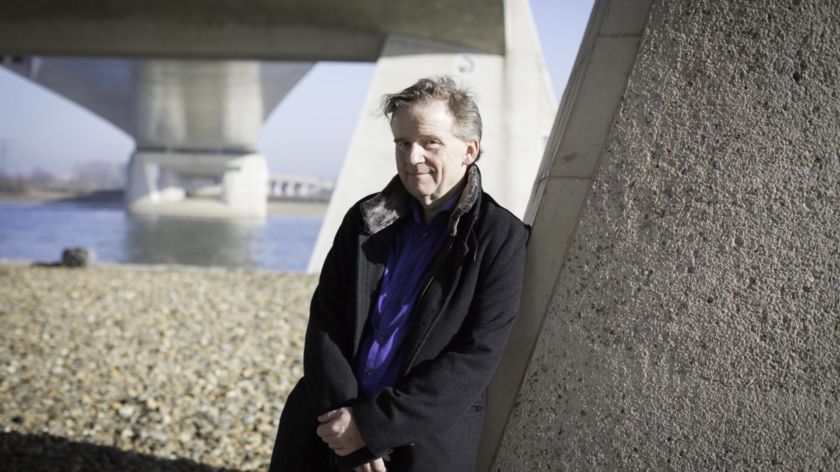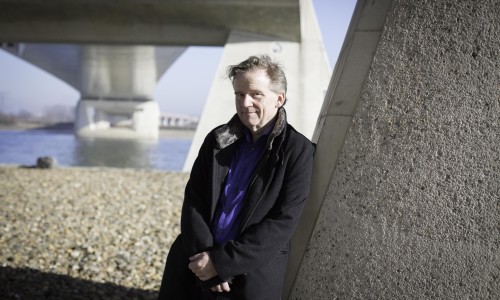Philosopher René ten Bos: ‘measures like a curfew are just scares’
-
 René ten Bos. Photo: Erik van 't Hullenaar
René ten Bos. Photo: Erik van 't Hullenaar
In the corona debate, too little is said about the proportionality of all the measures, says René ten Bos, and no, that doesn't make the philosophy professor a virus denier, he says. ‘Many corona measures are implemented purely because politicians want to give the impression of decisiveness.’
One month: that’s how long the nine-year-old (step-)son of philosophy professor René ten Bos recently had to be quarantined due to consecutive corona infections in his environment. The professor of Philosophy of Management Sciences found that over the top. ‘It just frightens a boy like that unnecessarily – he thinks, “I don’t know what is wrong, but apparently I am dangerous”. That does something to a child!’
Ten Bos cites the example to show that there is also another side to the crisis: the setbacks for the children. There are many children and young people who become anxious, who cannot go to school, who get depressed. ‘The reports you read about it are not positive. Consider, too, the proposal about the lottery for triages (that an old patient has the same right to a hospital bed as a young one, ed.).’ There is now an entire generation that thinks the cabinet is neglecting their interests, he says, and that’s a danger. ‘I can see the next Thierry Baudet rising up already.’
Idea of feasibility
As philosopher, he wants to allow these kinds of oppositions to be heard in this crisis, says the former Thinker Laureate in his living room in Nijmegen East. Ten Bos finds it problematic that there is currently only one dominant discourse, namely that the number of infections must be reduced at all costs, and that almost all means are permitted for this. ‘You hardly hear any criticism of this in the mainstream media, but if everyone agrees with each other, things will go wrong. As a philosopher you have to try and challenge the status quo.’
He wants to do so by emphasising that society is about more than just public health. ‘There is a tremendous idea of feasibility behind all corona measures, as if you could eliminate this virus. All that remains to be seen.’ There is far too little discussion about the price we pay for all the corona measures, says Ten Bos. ‘You solve certain problems, such as admissions to intensive care, but you get others in return, for example among young people. I am very concerned about the proportionality of it all.’
The measures are a necessary evil. We are dealing with a life-threatening pandemic.
‘Not if you look at it statistically. Yes, we have an additional pathogen, but – and when I say this, people get really angry – it’s not much more than an elderly disease. Covid-19 strikes mainly in ageing countries – you could even say it is a recovery operation of nature. We have long thought that we are above nature, but we are not. We are really being put in our place.’
Young people also get corona and end up in hospital, or have long-lasting symptoms.
‘Of course, young people can also be hit hard – that’s the case with all illnesses. But it is mainly the ones over 70 and 80 who die – the baby boomers. The pattern is exactly the same as with the flu – not a harmless disease at all, by the way, that’s a common misconception. Three years ago, we had a crazy flu wave, but we reacted very stoically. Why isn’t that happening now? That’s the question I have as a philosopher.’
Maybe because the excess mortality back then, in the winter of 2017-2018, was much smaller, about 9,000? According to Statistics Netherlands, 15,000 more than expected died last year – despite all measures.
‘But does that legitimise everything that is happening now? According to the most pessimistic scenario of Hugo de Jonge’s ministry, about 170,000 people are currently infected. That is only one in 105 Dutch people, but meanwhile we are pretending everyone is a biohazard.
‘Scaling down the regular care actually already constitutes a triage’
‘All things considered, this epidemic is not at all about the number of deaths, but about the burden on the care sector. Apparently, we think this sector is so important that everything else has to be sacrificed to it. Nobody wants Bergamo scenes or triages, but then I think to myself, why not? Scaling down the regular care actually already constitutes a triage – you just don’t make the choice about who dies more explicit.
‘If you don’t want any triages, why don’t we scale up the health sector, for example in terms of salaries? Yes, healthcare workers are now each receiving €1000, but that is a one-time gesture. If health is the most important thing we have, then working in health care should be made much more attractive.’
Why do you think that’s not happening?
‘From the 1990s, health care has become more and more like a car manufacturing company. There has been a management ideology behind it of weight loss and as little meat on the bones as possible. Lean management or just-in-time management – I have published a lot about that. Being stingy is just not wise in times of disproportionate burden, and we are finding that out now.’
But even when the care capacity is greater, there is a lot of excess mortality. Germany has five times as many IC beds per capita, but is also in lockdown, so apparently that doesn’t solve it either.
‘Strictly speaking, we have no idea which strategy is best. That is why scepticism should be much more emphatic in the debate than has been the case so far, I think. Doubt should play a part in everything you do. It is evident that keeping a distance works, as does reducing contact, but many other corona measures are implemented purely because politicians want to give an impression of decisiveness.’
Do you have an example?
‘Look at the masks, or the curfew: they are just scares, like a kind of magical ritual. Yes, masks help; but at most, two per cent, and only if you use them optimally. But in everyday use there aren’t any clinical conditions – I crumple them in my back pocket, too.
‘And as for the curfew that is about to go into effect – that measure fits the exceptional situation that we are bringing upon ourselves. In modern history, only during World War II did we have such a curfew – which shows that it’s not the virus that is our enemy, but our fear of that virus.’
Is that bad? Every little bit helps, right?
‘For sure, that’s bad. By prohibiting or obliging something, the government restricts the freedom of citizens. There has been no epidemic in history whereby governments have attempted to tighten their grip on the population. Statements like “this is the greatest challenge since World War II” only amplify fear. What you get now is that people will issue complaints if others don’t follow the rules. Local governments also encourage this.’
You called it ‘Corona fascism’ in an interview with Café Weltschmerz (a YouTube channel popular among conspiracy thinkers, see box).
‘Yes, it is a form of fascism without any fascists. I derived that concept from the philosopher Franco Berardi. He means that we all do things we don’t want to, but we do them with good intentions, because we consider them necessary. In practice this creates a situation that you can call fascist. We declare war on human behaviour en masse. Natural tendencies like hugging or shaking hands are now declared to be wrong, even though everyone knows how difficult behavioural change is. I find that outrageous – even atrocious.’
The alternative is also unappealing. If you let the virus circulate, the excess mortality is many times greater, and of course that also disrupts society. Furthermore, group immunity does not arise by itself: we saw that in Brazil, in the city of Manaus, and in Sweden.
‘I don’t know what the right decision is – nobody knows. But as a government you also have to look at the consequences of every measure. I hope that the urgency that is now being shown towards health care will soon also be there for the younger generation. They are the ones who will soon have to pay all the billions that are now borrowed for stimulus packages.
‘And also think about the long term – even when this virus is over, new ones will come. We saw that in the past, with the swine flu and SARS. Do we go from lockdown to lockdown every time? We now mainly think curatively – how can we solve the problem? – through measures such as lockdowns and ultimately the vaccine as an almost religious redemption. We should actually focus a lot more on prevention.’
In what form?
‘By dealing better with the environment. Viruses such as corona are zoonotic diseases (diseases that jump from animals to humans, ed.), which arise from intensive animal husbandry. As long as we continue to eat meat, cut down rainforests, and spread our production chains around the world, we will continue to experience these kinds of outbreaks. It is not without reason that the outbreak in Europe started in Lombardy: the entire region is totally dependent on China in terms of trade. It has long been clear what we should do. The question is, is there political will?
‘I see it through a dark lens, because the government is notoriously bad at prevention. Every year there are still 20,000 tobacco-related deaths in the Netherlands, and the obesity epidemic is also getting worse. Look at all the unhealthy food you can still buy on campus. Obesity increases the risk of all kinds of diseases, including Covid-19.’
Seen ecologically, sooner or later a population is ‘reset’, you said. Aren’t we then fighting a losing battle?
‘Yes, but that ecological view obviously clashes with the moral side of the story. I’m still a philosopher, you know. What is “good” for nature can of course clash enormously with your and my interests.’
Nobody wants to die ‘prematurely’.
‘Exactly. In fact, we have a hard time dealing with our mortality.’
That’s what Marli Huijer says, your predecessor as Thinker Laureate.
‘I often agree with her. Marli Huijer is a philosopher just like me – we have to formulate these kinds of thoughts. It’s our task to keep feeding the discomfort.’
Conspiracy thinkers
Ten Bos’ appearances in various media have caused quite a stir lately. One of the reasons was an interview at Café Weltschmerz, which was entitled ‘Is the Corona Storm Fascist?’ YouTube channel Weltschmerz is popular among self-proclaimed dissenters. In the Christmas edition of the Dutch Journal of Medicine (Nederlands Tijdschrift voor Geneeskunde), Ten Bos also wondered whether corona is just a ‘hype’, which upset many people. ‘Delete yourself’, Marino van Zelst tweeted, for example, in response to the NTvG article. Van Zelst is a member of the so-called Red Team that critically monitors whether the corona measures of the cabinet are adequate. Ira Helsloot, professor of Governance and Safety, called Ten Bos’ NTvG article a ‘great piece’ on LinkedIn, but LinkedIn removed that message this weekend, because it allegedly went against the social media company’s ‘Professional Community Policies’.
With all this talk about hype and fascism – has Ten Bos become a conspiracy thinker or virus denier? ‘No, of course not,’ he says. ‘I fully support measures such as washing hands or keeping your distance. I usually also adhere to all measures. In my NTvG article I give a precise information-theoretical definition of a ‘hype’, namely something that causes so much controversy that a lot of information and misinformation is generated at the same time. That’s exactly what you see happening now.’ The same is true of the comments about fascism, he says. ‘I’m not saying that the government is made up of fascists – of course not – but that the corona rules could lead to some kind of fascist situation.’
The fact that the average reader or viewer has other associations with hype or with fascism is not something that Ten Bos is concerned about. ‘And what’s wrong with giving interviews to Café Weltschmerz? That club isn’t banned, is it? It’s outrageous that people have problems with me being active on that platform – it’s alarming that that kind of thing even happens. Right now, I want to discuss issues with everyone and everything.’ That some people prefer to ‘delete’ him, he says, already shows how radically opposing views are banned.
Ten Bos is not afraid that conspiracy thinkers will want to put him to the test. ‘In fact, on the Café Weltschmerz website I got a lot of criticism because I was supposedly too moderate. I will not go along with ideas that the virus was made in the lab.’ But you do have to listen to conspiracy thinkers, he emphasises: in Ten Bos’ view, the fact that they draw the wrong conclusions is less important to him than the genuine concerns they have. ‘The stormers of the Capitol in Washington weren’t all crazy either. Look at Pfizer (the company that made the first vaccine, ed.) – it is notorious for its history of corruption. Politicians are just as opportunistic as those companies. It would be strange if we now suddenly give all those parties our trust instead of following them critically.’


